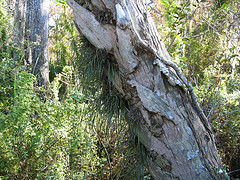Barley Barber Swamp facts for kids
The Barley Barber Swamp is a special place in Florida. It was once a huge bald cypress forest and waterway. Today, this 450-acre (180 ha) area is surrounded by a power plant. This plant belongs to Florida Power & Light (FPL).
The swamp is located near Lake Okeechobee and the town of Indiantown, Florida. It is named after a man called Barley Barber. He lived in the area a long time ago, around the early 1900s. He left the region many years ago.
Contents
Where is Barley Barber Swamp?
Its Connection to the Everglades
Long ago, the Barley Barber Swamp was connected to other wetlands. These included the Allapatah Marsh. Water from the swamp flowed into Lake Okeechobee. From there, it helped feed the huge Everglades ecosystem to the south.
Ancient People and History
This area was once an important trading spot for Native American groups. These people lived around Lake Okeechobee. There is a 16 ft (4.9 m) tall sand mound in the swamp. Experts believe that ancient people used this mound for trading pottery. Scientists have found pottery pieces and human remains on the mound. These items are between 300 and 900 years old.
Changes Over Time
The natural water flow in Barley Barber Swamp changed a lot over the years. This started in the late 1800s. That's when Henry Flagler built the Florida East Coast Railway. Later, other projects like drainage canals and highways were built. The Herbert Hoover Dike was also built around Lake Okeechobee. All these changes affected how water moved through the swamp.
Today, the Barley Barber waterway is sent through a canal. It goes into the St. Lucie canal before reaching Lake Okeechobee. Even with these changes, you can still travel by boat through parts of it.
What Animals and Plants Live Here?
The Barley Barber Swamp is home to some amazing plants and animals.
Giant Cypress Trees
One of the oldest bald cypress trees in the southeastern U.S. lives here. It is thought to be over 1,000 years old! This giant tree stands 88 ft (27 m) tall. Its base is about 33 ft (10 m) around.
Other Plants
You can also find other unique trees here. These include Florida strangler figs (Ficus aurea). There are also swamp maples (Acer rubrum) and pond apples (Annona glabra).
The swamp has many special ferns too. Look for giant leather ferns (Acrostichum danaeifolium). You might also spot shoestring ferns (Vittaria lineata) and whisk ferns (Psilotum species). These are fern-like plants.
Wildlife in the Swamp
Many animals call Barley Barber Swamp home. You might see a pair of bald eagles nesting there. There are also American alligators and North American river otters. Other animals include bobcats and white-tailed deer.
Many kinds of wading birds and migratory birds visit the swamp. These include egrets, ibises, and limpkin. The endangered wood stork can also be seen here.
Visiting the Swamp
Power Plant and Tours
Florida Power & Light bought the land around the swamp in 1972. They built the Martin County power plant there. FPL promised to protect and improve the swamp. They said it had many endangered species.
After the power plant opened, FPL built a 1.9 mi (3.1 km) boardwalk. This allowed people to take tours of the Barley Barber Swamp. Local businesses in Indiantown, like the historic Seminole Inn, helped organize these tours. The swamp was good for both the environment and the local economy.
Swamp Access Today
After the events of September 11, 2001, FPL closed all access to the Barley Barber Swamp. They said it was for security reasons.
|
 | James Van Der Zee |
 | Alma Thomas |
 | Ellis Wilson |
 | Margaret Taylor-Burroughs |




